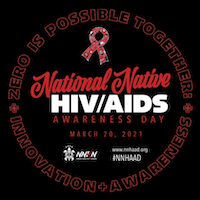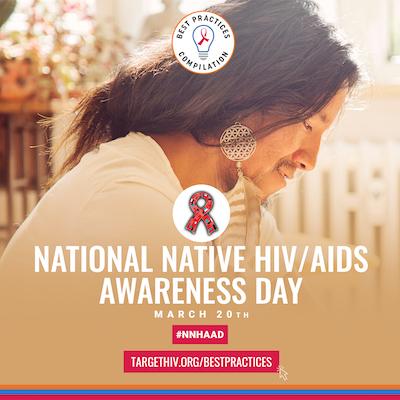
Nearly three-fourths of HRSA Ryan White HIV/AIDS Program (RWHAP) clients are from racial/ethnic minority populations. American Indians/Alaska Natives (AI/AN) comprise 0.5% of persons receiving HIV care from the RWHAP. The majority are low income, men who have sex with men, and over 50 years of age.
National Native HIV/AIDS Awareness Day is March 20. The 2024 theme is: It’s all relative, our experience makes a difference. See HIV.gov's Resources for 2024 National Native HIV/AIDS Awareness Day.
From 2010 to 2022, viral suppression rates increased among all populations getting RWHAP medical care (69.5% to 89.6%), including American Indian/Alaska Native clients (70.4% to 88.3%) (2022 Ryan White HIV/AIDS Program Annual Client-Level Data Report, HRSA 2023).
Read the 2023 HRSA letter on addressing syphilis within American Indian/Alaska Native communities.
HIV Care Innovations
HRSA's RWHAP funds a "pipeline" of initiatives to explore best practices in HIV care. Many are subsequently assessed for inclusion in the Best Practices Compilation of interventions that have demonstrated effectiveness at improving client HIV outcomes.
One such intervention is TIA/CHANGE, Trauma-Informed Approach & Coordinated HIV Assistance and Navigation for Growth and Empowerment. This intervention, implemented by the Alaska Native Tribal Health Consortium, guides organizations to become trauma-informed. Elements include enrollment of clients in trauma-informed intensive case management services. Over a 12 month period:
- ART prescription increased from 97% to 100%.
- Viral suppression increased from 73% to 85%.
TIA/CHANGE was implemented by the Alaska Native Tribal Health as part the E2i SPNS Initiative. Under E2i, the project developed an implementation guide and toolkit (inclusive of instructional videos and an e-learning module).
See the full range of interventions developed under E2i, all of which have been incorporated within the Best Practices Compilation.
Technical Assistance and Training Tools
Following are select resources in our collection of tools for HIV care programs.
- Practice Transformation Project at the Native American Community Clinic is a Best Practice that, with support from the Midwest AETC, increased the HIV testing rate by 10 percent, compared to baseline. See more Best Practices.
- Key Populations, HIV in Racial and Ethnic Minority Populations is one of the lessons within the National HIV Curriculum, HRSA's AIDS Education and Training Centers (AETC) online guide for HIV clinicians (HRSA and AETC NCRC).
- Clinician's Guide: Working with Native Americans Living with HIV. This document is for medical providers, and it summarizes cultural challenges and solutions for delivering HIV/AIDS care to Native Americans. The guide was developed in 2002 and has since been updated.
See more results from our search engine, using terms "American Indian" and "Native American."
RWHAP Policy
See HRSA's HIV/AIDS Bureau Policy Notice 07-01 Use of Funds for American Indians and Alaska Natives and Indian Health Service Programs on access to RWHAP services for AI/AN populations.
